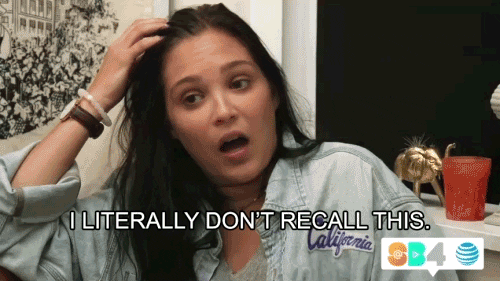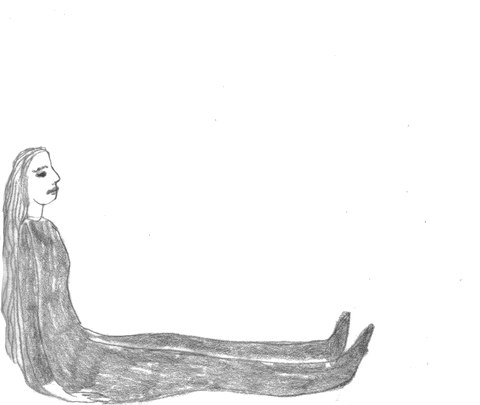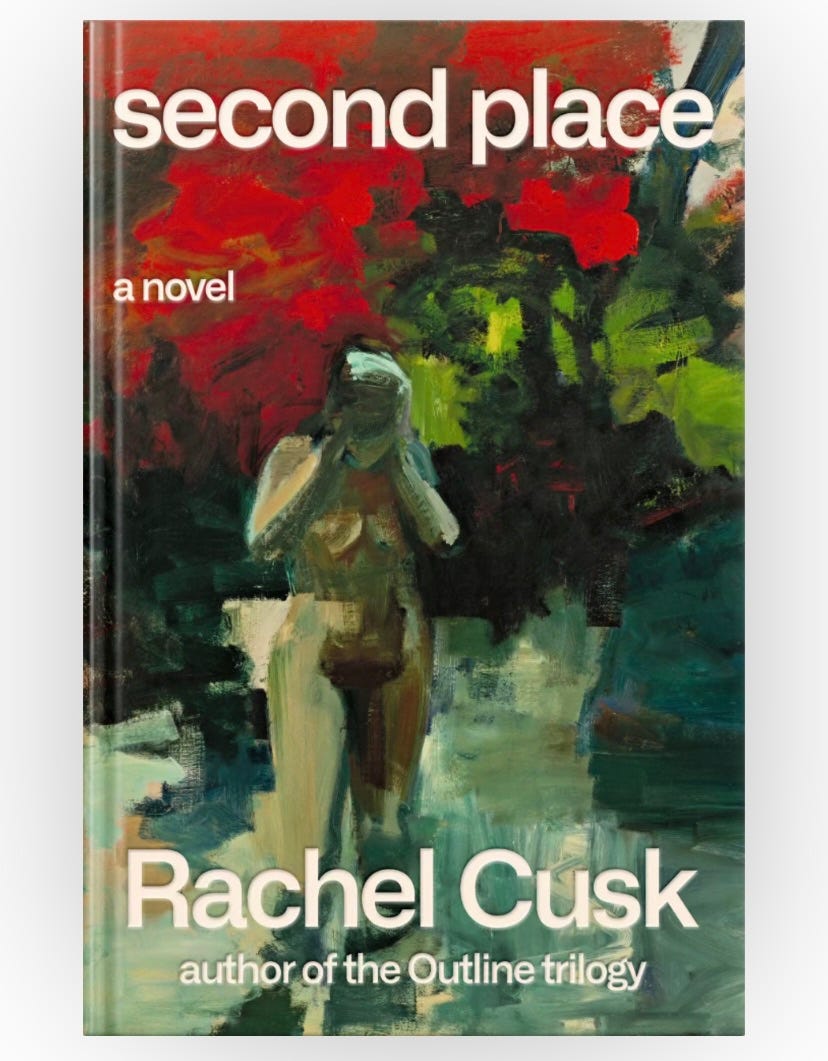'Second Place' by Rachel Cusk
'Why do we suffer so, from the things we ourselves have invented?'—Review #161

Great news! Books on GIF was a featured newsletter on Substack’s homepage for a full week, giving us a wonderful boost following our most recent edition. A fresh batch of newsletters are featured there now, so I tweeted a screenshot for posterity. To our new subscribers, we say:

I’m not a Rachel Cusk completist, but the universe seemingly wants me to be one. I reviewed her ‘Outline’ trilogy novels—‘Outline’ / ‘Transit’ / ‘Kudos’—and had no immediate plans to return to her work. But late last year, I preordered the iBooks edition of ‘Second Place’ and then immediately forgot about it. When the book came out last month and I was charged for it, I was like:

But it’s a new book people are talking about, so let’s dive in.
Here’s the cover:
If you enjoy this review, click the ♥️ above or
New here?
A writer named M is so moved by the paintings of an artist named L that she invites him to spend a season painting in the ‘Second Place,’ a guest cottage on the marshland property where she lives with her husband and adult daughter. Her expectations are that L will come alone and that they will connect in a way that affirms her literary career as the work of an authentic artist. But L arrives with a much younger girlfriend in tow, and he and M clash. With expectations dashed, M is tormented by her insecurities and anxieties, feeling that she has always been in an existential second place, both in a male-centric art world and in her life generally. She feels unable to take the risks that define other artists. She is not as handy around the house as her husband. She is no longer young like her daughter. Even though she has success, a loving family, an idyllic home and a famous artist living with her (an affirmation in itself), she is confined by the belief she has come up short and spirals like:

I struggled to care about M’s plight. I felt her desire for artistic affirmation was a niche dilemma, one many of us aren’t privileged with the time or opportunity to experience. I also get frustrated by characters, and people, who can’t see the positive things in their lives that are right in front of their faces. Cusk uses a device where M is narrating her story to a character named Jeffers who we never see or learn anything about. Who is Jeffers? Maybe I missed it, or maybe it doesn’t matter and can be chalked up to poetic license and writer’s choices, but I was annoyed. Plus, I couldn’t shake the notion that I had already read a better version of this story in Harper’s Magazine when Ann Patchett wrote about the painter who lived in her finished basement. It’s a wonderful piece.

While talking about ‘Second Place’ with Donna and Heidi over lunch yesterday, I remembered seeing it described somewhere as the first ‘pandemic novel.’ Later, I tracked down the source. Based on that headline, I assumed this label referred to the vague travel difficulties mentioned in the story that contributed to L's stay at the Second Place, foreshadowing the inevitability of references to masking, social distancing and lockdowns creeping into popular culture. But during our discussion we wondered how writers, filmmakers and other artists would translate the anxieties and fears of the pandemic into their works. On the walk home, it struck me that perhaps M’s need to be affirmed by L reflects our reliance on others for our feelings of self worth, and how we were deprived of that this past year. It also made me think about how we sometimes seek that affirmation from strangers on social media and dating sites. When I considered ‘Second Place’ that way, I started to rethink whether it was simply a book about an esoteric quandary. But even seen in a new light, that didn’t make me feel more connected to M or her journey. Others might feel differently. Cusk’s writing is as good as I remember, but I thought ‘Second Place’ was just OK.
How it begins:
I once told you, Jeffers, about the time I met the devil on a train leaving Paris, and about how after that meeting the evil that usually lies undisturbed beneath the surface of things rose up and disgorged itself over every part of life. It was like a contamination, Jeffers: it got into everything and turned it bad. I don’t think I realised how many parts of life there were, until each one of them began to release its capacity for badness. I know you’ve always known about such things, and have written about them, even when others didn’t want to hear and found it tiresome to dwell on what was wicked and wrong. Nonetheless you carried on, building a shelter for people to use when things went wrong for them too. And go wrong they always do!
Fear is a habit like any other, and habits kill what is essential in ourselves. I was left with a kind of blankness, Jeffers, from those years of being afraid. I kept on expecting things to jump out at me—I kept expecting to hear the same laughter of that devil I heard the day he pursued me up and down the train. It was the middle of the afternoon and very hot, and the carriages were crowded enough that I thought I could get away from him merely by going and sitting somewhere else. But every time I moved my seat, a few minutes later there he’d be, sprawled across from me and laughing. What did he want with me, Jeffers? He was horrible in appearance, yellow and bloated with bloodshot bile-coloured eyes, and when he laughed he showed dirty teeth with one entirely black tooth right in the middle. He wore earrings and dandyish clothes that were soiled with the sweat that came pouring out of him. The more he sweated, the more he laughed! And he gabbled non-stop, in a language I couldn’t recognise—but it was loud, and full of what sounded like curses. You couldn’t exactly ignore it, and yet that was precisely what all the people in the carriages did. He had a girl with him, Jeffers, a shocking little creature, nothing more than a painted child who was barely clothed—she sat on his knee with parted lips and the soft gaze of a dumb animal while he fondled her, and nobody said or did a thing to stop him. Of all the people on that train, was it true that the one most likely to try was me? Perhaps he followed me up and down the carriages to tempt me into it. But it was not my own country: I was only passing through, going back to a home I thought of with secret dread, and it didn’t seem up to me to stop him. It’s so easy to think you don’t matter all that much at the very moment when your moral duty as a self is most exposed. If I’d stood up to him, perhaps all the things that happened afterwards wouldn’t have occurred. But for once I thought, let someone else do it! And that is how we lose control of our own destinies.
My rating:
‘Second Place’ by Rachel Cusk was published by Farrar, Straus and Giroux in 2021. 201 pages (in the Apple ebook version). $23 at Bookshop.org.
Disagree with my review? Let me know:
Connect: Twitter | Instagram | Goodreads | Email
Before you go:
ICYMI: Review #160 featured ‘The Passion According to G.H.’ by Clarice Lispector | Browse the Archive
Read this: Ottessa Moshfegh has a candidate for paragraph of the year in Bookforum (scroll down) describing how risky and dangerous novels should be. Here’s a sample:
We need characters in novels to be free to range into the dark and wrong. How else will we understand ourselves?
FYI, I am a Moshfegh completist so I will review her latest novel, ‘Death in Her Hands,’ shortly after its paperback release later this month.
Read this, too: The New Republic drops a bomb on Malcolm Gladwell’s new book, ‘The Bomber Mafia: A Dream, a Temptation, and the Longest Night of the Second World War.” Gladwell is dismantled here for basically missing the point of his own thesis. Yikes!
Thanks for reading, and thanks especially to Donna for editing this newsletter!
Until next time,
MPV









The editions use of gifs is stellar, despite your review of “meh” for this book. Perhaps Cusk could use gifs to improve the book. A thought.